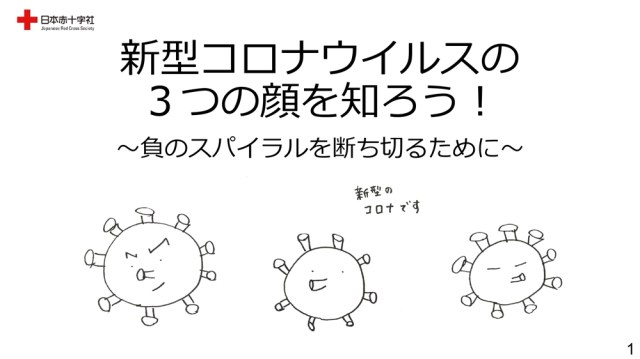
One of these “faces” discriminates against people who have the virus.
While a number of countries around the world are taking drastic measures to flatten the curve of the coronavirus outbreak, this week the Japanese government said it’s “still holding on” and “at the brink” of declaring a national state of emergency.
While some businesses have adopted teleworking and a number of big tourist sites remain closed, stores, restaurants and public transport remain open as usual. In addition, people are not being asked to maintain any specific distance between each other, but to avoid the “Three Cs” instead.
#COVID19 update: The experts on the novel #coronavirus stress the need to avoid three overlapping conditions. The “Three Cs” are: closed spaces, crowded places and close-contact settings. https://t.co/YYg68WBsxo (please follow the guidelines for the public use of this poster.) pic.twitter.com/dON2CasDAE
— PM's Office of Japan (@JPN_PMO) March 29, 2020
With cases rising in Osaka and Tokyo at the moment, governors in these prefectures have stepped up countermeasures by calling on locals to avoid non-urgent and non-essential travel, and now that beloved Japanese comedian Ken Shimura sadly passed away after contracting the virus, people in Japan are beginning to sit up and take the escalating health crisis seriously.
Now a new awareness campaign has been created by the Japanese Red Cross Society to help educate people on COVID-19, and it’s catching everyone’s attention with its personification of the virus in manga-style form.
▼ “Let’s get to know the three faces of the novel coronavirus!”
According to the awareness campaign, the virus has three different faces which represent three types of infection that we need to be aware of, and we should get to know them all to “destroy the negative spiral” that can lead to further spread of the virus.
▼ The speech bubble here says: “There are three faces to me lololol…”
The first “face” of the virus is the virus itself, which causes cold and flu-like symptoms in those it comes into contact with, and can turn into pneumonia in more serious cases.
The second “face” of the virus is anxiety and fear. Because it’s invisible to the human eye, and no vaccines or drugs to protect against it exist yet, it’s easy to feel frightened and helpless against the virus. But if we allow those feelings to overwhelm us, we will become weak to awareness, questioning, and morale, causing infections to spread from person to person like wildfire.
▼ This image shows “Fuan-chan”, or “Little Miss Anxiety”.
The third “face” of the virus is disgust, prejudice, and discrimination. Anxiety and fear stimulate the human “instinct to survive” so people who are infected by the virus or have some relation to it may be kept away from daily life and discriminated against, destroying the relationship of trust between people and society.
Why does “disgust, prejudice, and discrimination” arise? Because anxiety about the invisible enemy, the virus, causes related objects to be seen as visible enemies, they’re therefore disliked. Avoiding these objects then gives people a fleeting sense of security.
From this, remarks such as “That area’s dangerous”, or “That person’s dangerous” or “That person coughing has coronavirus” start being made, but the original enemy is the virus. We shouldn’t lose sight of the real enemy.
The Japanese Red Cross Society wants everyone to know that the three faces of the virus are all connected. The unknown virus, which we don’t know a lot about, gives birth to anxiety and fear, which in turn gives birth to discrimination. When people are afraid of being discriminated against, they might refrain from going to the doctor, even if they have a fever or cough, which results in the virus spreading.
We need to be strong against fear and discrimination in order to stop the negative spiral and contain the virus.
▼ “We are One Team!!”
This strong message against discrimination is actually an important one to be made in Japan, where people and places can suffer negatively after being “tainted” by illness. Fukushima, for example, is still perceived to be unsafe as a whole after the 2011 nuclear disaster, and descendants of the Hiroshima and Nagasaki atomic bomb survivors still face discrimination outside of their locales today.
Japanese singer and heartthrob Masaharu Fukuyama surprised everyone when he publicly revealed he was the son of two A-bomb survivors, which made many people here reconsider their prejudicial lines of thought. Here’s hoping this message from the Japanese Red Cross Society does the same for coronavirus, because there’s no time to waste in taking action against this invisible foe.
Source, images: Japanese Red Cross Society
● Want to hear about SoraNews24’s latest articles as soon as they’re published? Follow us on Facebook and Twitter!

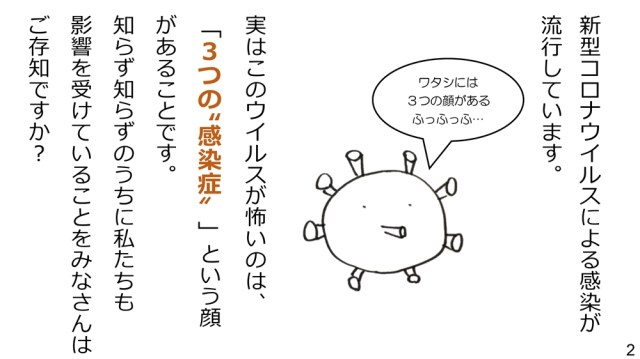
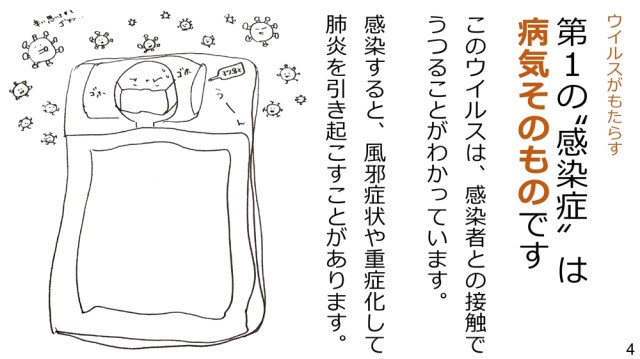
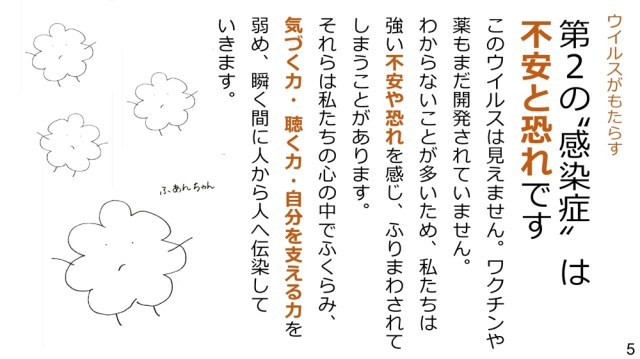

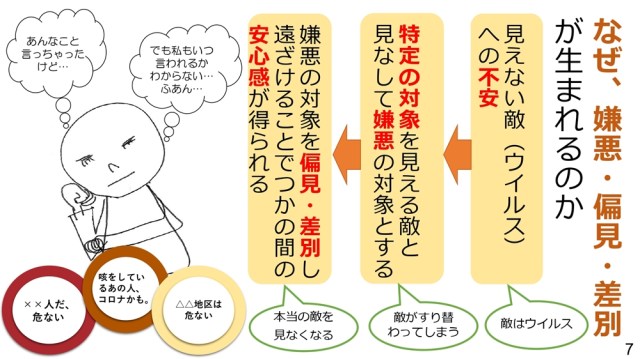
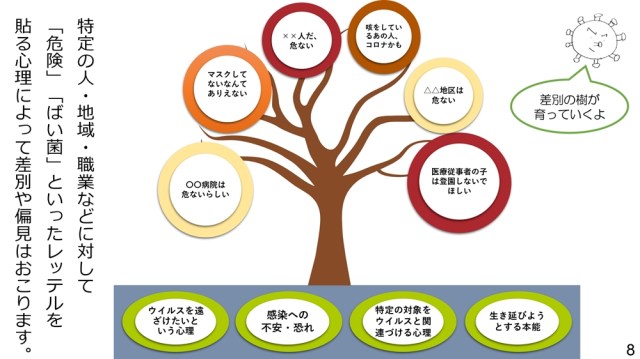
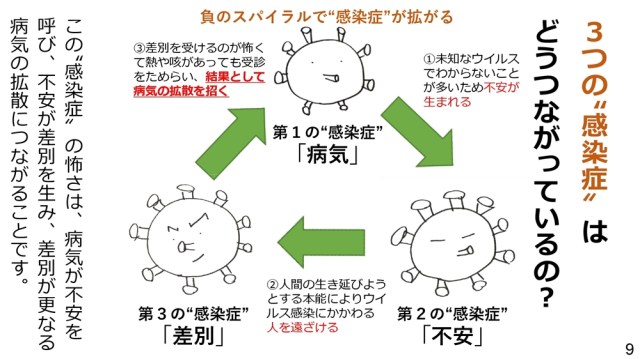
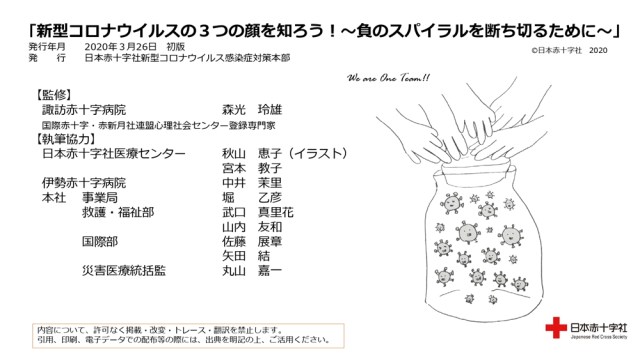
 Why have no COVID-19 clusters occurred in pachinko parlors?
Why have no COVID-19 clusters occurred in pachinko parlors? Ninja Castle in Tokyo has heartwarming message for foreign tourists in midst of coronavirus
Ninja Castle in Tokyo has heartwarming message for foreign tourists in midst of coronavirus New Tokyo cat cafe filled only with “Apple Cats” who have feline AIDS
New Tokyo cat cafe filled only with “Apple Cats” who have feline AIDS Japanese Red Cross releases important video on dealing with COVID-19 in a different way
Japanese Red Cross releases important video on dealing with COVID-19 in a different way Manga artist and adult filmmaker lists Miyazaki anime among the worst, “most dangerous” out there
Manga artist and adult filmmaker lists Miyazaki anime among the worst, “most dangerous” out there McDonald’s new Happy Meals offer up cute and practical Sanrio lifestyle goods
McDonald’s new Happy Meals offer up cute and practical Sanrio lifestyle goods Studio Ghibli releases new action figures featuring Nausicaä of the Valley of the Wind characters
Studio Ghibli releases new action figures featuring Nausicaä of the Valley of the Wind characters Studio Ghibli glasses cases let anime characters keep an eye on your spectacles
Studio Ghibli glasses cases let anime characters keep an eye on your spectacles All-you-can-drink Starbucks and amazing views part of Tokyo’s new 170 meter-high sky lounge
All-you-can-drink Starbucks and amazing views part of Tokyo’s new 170 meter-high sky lounge Super Nintendo World expansion gets delayed for several months at Universal Studios Japan
Super Nintendo World expansion gets delayed for several months at Universal Studios Japan Is the new Shinkansen Train Desk ticket worth it?
Is the new Shinkansen Train Desk ticket worth it? Ghibli action figures bring Nausicaä of the Valley of the Wind soldiers to life in 3-D form
Ghibli action figures bring Nausicaä of the Valley of the Wind soldiers to life in 3-D form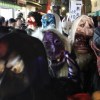 Kyoto’s 100 Demons yokai monster parade returns!
Kyoto’s 100 Demons yokai monster parade returns! Tokyo Station’s perfect breakfast spot might just be this izakaya Japanese-style pub
Tokyo Station’s perfect breakfast spot might just be this izakaya Japanese-style pub Cappuccino Ramen becomes super popular in Japan, but is it worth the hype?
Cappuccino Ramen becomes super popular in Japan, but is it worth the hype? More foreign tourists than ever before in history visited Japan last month
More foreign tourists than ever before in history visited Japan last month Disney princesses get official manga makeovers for Manga Princess Cafe opening in Tokyo
Disney princesses get official manga makeovers for Manga Princess Cafe opening in Tokyo Starbucks reopens at Shibuya Scramble Crossing with new look and design concept
Starbucks reopens at Shibuya Scramble Crossing with new look and design concept Beautiful new Final Fantasy T-shirt collection on the way from Uniqlo【Photos】
Beautiful new Final Fantasy T-shirt collection on the way from Uniqlo【Photos】 Foreign English teachers in Japan pick their favorite Japanese-language phrases【Survey】
Foreign English teachers in Japan pick their favorite Japanese-language phrases【Survey】 Beautiful Sailor Moon manhole cover coasters being given out for free by Tokyo tourist center
Beautiful Sailor Moon manhole cover coasters being given out for free by Tokyo tourist center Studio Ghibli releases Kiki’s Delivery Service chocolate cake pouches in Japan
Studio Ghibli releases Kiki’s Delivery Service chocolate cake pouches in Japan Japan’s bone-breaking and record-breaking roller coaster is permanently shutting down
Japan’s bone-breaking and record-breaking roller coaster is permanently shutting down New definition of “Japanese whiskey” goes into effect to prevent fakes from fooling overseas buyers
New definition of “Japanese whiskey” goes into effect to prevent fakes from fooling overseas buyers Our Japanese reporter visits Costco in the U.S., finds super American and very Japanese things
Our Japanese reporter visits Costco in the U.S., finds super American and very Japanese things Studio Ghibli unveils Mother’s Day gift set that captures the love in My Neighbour Totoro
Studio Ghibli unveils Mother’s Day gift set that captures the love in My Neighbour Totoro Domino’s Japan now sells…pizza ears?
Domino’s Japan now sells…pizza ears? New Japanese KitKat flavour stars Sanrio characters, including Hello Kitty
New Japanese KitKat flavour stars Sanrio characters, including Hello Kitty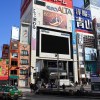 One of Tokyo’s most famous meeting-spot landmarks is closing for good
One of Tokyo’s most famous meeting-spot landmarks is closing for good Kyoto creates new for-tourist buses to address overtourism with higher prices, faster rides
Kyoto creates new for-tourist buses to address overtourism with higher prices, faster rides Sales of Japan’s most convenient train ticket/shopping payment cards suspended indefinitely
Sales of Japan’s most convenient train ticket/shopping payment cards suspended indefinitely Sold-out Studio Ghibli desktop humidifiers are back so Totoro can help you through the dry season
Sold-out Studio Ghibli desktop humidifiers are back so Totoro can help you through the dry season Japanese government to make first change to romanization spelling rules since the 1950s
Japanese government to make first change to romanization spelling rules since the 1950s Ghibli founders Toshio Suzuki and Hayao Miyazaki contribute to Japanese whisky Totoro label design
Ghibli founders Toshio Suzuki and Hayao Miyazaki contribute to Japanese whisky Totoro label design Doraemon found buried at sea as scene from 1993 anime becomes real life【Photos】
Doraemon found buried at sea as scene from 1993 anime becomes real life【Photos】 Tokyo’s most famous Starbucks is closed
Tokyo’s most famous Starbucks is closed One Piece characters’ nationalities revealed, but fans have mixed opinions
One Piece characters’ nationalities revealed, but fans have mixed opinions We asked a Uniqlo employee what four things we should buy and their suggestions didn’t disappoint
We asked a Uniqlo employee what four things we should buy and their suggestions didn’t disappoint Princesses, fruits, and blacksmiths: Study reveals the 30 most unusual family names in Japan
Princesses, fruits, and blacksmiths: Study reveals the 30 most unusual family names in Japan Japanese mouthwash effective against coronavirus, according to Osaka Governor
Japanese mouthwash effective against coronavirus, according to Osaka Governor Japanese mayor who bit athlete’s gold medal tests positive for coronavirus
Japanese mayor who bit athlete’s gold medal tests positive for coronavirus Toyama Prefectural University able to locate potential COVID-19 clusters from raw sewage
Toyama Prefectural University able to locate potential COVID-19 clusters from raw sewage Chinese E-cigarettes might be wreaking more havoc on your computer than on your lungs
Chinese E-cigarettes might be wreaking more havoc on your computer than on your lungs Could Coronavirus be helping prevent the spread of influenza? Japanese Twitter speculates
Could Coronavirus be helping prevent the spread of influenza? Japanese Twitter speculates Hot spring in Gunma Prefecture found to reduce COVID-19 infectivity by over 90 percent
Hot spring in Gunma Prefecture found to reduce COVID-19 infectivity by over 90 percent World-first confirmation that masks can protect you from coronavirus【Video】
World-first confirmation that masks can protect you from coronavirus【Video】 Studio Ghibli Museum closes due to coronavirus fears
Studio Ghibli Museum closes due to coronavirus fears Living with coronavirus in a Japanese share house
Living with coronavirus in a Japanese share house Tokyo cat cafe reopens weeks after virus outbreak kills over 25 percent of its feline population
Tokyo cat cafe reopens weeks after virus outbreak kills over 25 percent of its feline population Nara University study finds some common teas can neutralize COVID-19
Nara University study finds some common teas can neutralize COVID-19 Sad news: 1,266 famous Tokyo plum trees get the axe to prevent spread of “plum pox”
Sad news: 1,266 famous Tokyo plum trees get the axe to prevent spread of “plum pox” Demon Slayer manga creator offers a motivational illustration during the pandemic
Demon Slayer manga creator offers a motivational illustration during the pandemic COVID-19 appears to be suppressing the flu in Japan, number of cases down and decreasing
COVID-19 appears to be suppressing the flu in Japan, number of cases down and decreasing
Leave a Reply